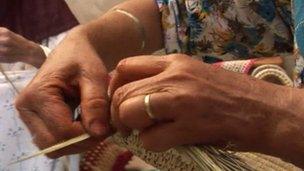My Business: Weaving independence for Moroccan women
- Published
Wafa Zerrouki, founder of La Femme Artisan: "As in all businesses, there are ups and downs"
What makes an entrepreneur? BBC Africa's Nora Fakim meets a Moroccan graduate who has built a business with the aim of transforming the lives of low-income rural women in the country.
"It's another world here," Wafa Zerrouki says, as we visit the rural women who are at the heart of her business, La Femme Artisan.
Just 25 minutes' drive from bustling Marrakesh, a group of women in traditional clothing sit together making the baskets that they have learned to weave and now sell for up to $13 (£8, 10 euros) each.
Wafa says 80% of rural women cannot read and write, and the culture is conservative.
"Most of the women here could not just leave their homes to come and work for me. I had to talk to their families and make them realise that what these women are doing is something positive," says Wafa.
One of them, Selwa, is married with a two-year-old, but doesn't know her own age.
Communication is limited to basic Arabic, as the women mainly speak the local language Berber, while Wafa speaks French and Arabic.
Urban struggle
The elegantly dressed, 37-year-old business graduate had long wanted to set up a social enterprise specifically for women, and started the business at the age of 28, with just $200.
Beginning in the centre of Marrakesh, she barely broke even in the first two years, and had a turnover of just $260. The rural women found it hard to commute. Some could not get permission from family members to travel.
So she opened a rural workshop, and had the idea of weaving with natural materials, such as pine leaves and grass, which the women could gather from near their own homes.
But Marrakesh, with its plentiful tourists, remained the primary market.
"It takes about two to three days to make a bag," Wafa says.
Between 5% and 10% of the sale price goes to the company - the women keep the rest.
Client networks
Over the years, Wafa has borrowed about $2,500 (£1,700, 2,000 euros) from microcredit organisations, which she has used to cover costs such as office rental, help with product design and training for the women.
The loans have now been largely recouped. The business has expanded from 10 basket-makers to more than 100, and annual turnover is about $13,000.
The bags and baskets are sold to traders who market them to tourists - mainly in Morocco, but also as far afield as Belgium, France and Spain.
Initially Wafa says she made three such deals a month - now it's about 10.
But despite the expansion, when asked about profits, Wafa is reluctant to give a figure and says her main aims are social, rather than financial.
The women are taught about business and markets. Most enrol in classes to learn how to read and write. Some have managed to make contacts and learned to build their own client networks.
The rewards come in the transformation, Wafa says, as vulnerable women with low self-esteem become able to "stand on their own two feet".
Making money gives them independence and enables them to "gain the trust of their husbands", she says.
Furthermore, many can eventually send their children to private schools, where results tend to be better than the rural state schools, in which dropout rates can be as high as one in three.
Social attitudes
In the country of about 32 million people, the UN estimates that just over a quarter of working-age women participate in the labour market.
While this is higher than in many Arab countries, Morocco is the third lowest-ranking Arab country on the UN's gender-related development index, above Yemen and Iraq.
Just a fifth of women over 25 have at least secondary school education.

One of the business costs has been training the women
And, according to Unicef, women are paid on average 40% less than men with similar qualifications.
However, the Moroccan Association of Women Entrepreneurs says that more than 5,000 female entrepreneurs operated businesses in the country's formal economic sectors in 2009 - and it's likely there are many others doing so informally.
Wafa says she has also had social attitudes to contend with in her mission to set up the company.
"For a woman in Morocco there are always obstacles," she says.
"Whether you are married or single, rich or poor, you always have to prove that you are worth something.
"As a single woman myself I have found it hard to find a man who would understand that I want to work and not stay at home to look after the kids."
Wafa is keen to train more women and expand the company to more rural areas.
And she's also hopeful that another dream might be fulfilled - finding a husband who will be supportive of her business ambitions.
- Published7 December 2011
- Published9 November 2011
- Published8 November 2011
- Published18 October 2011
- Published26 September 2011
- Published27 June 2011